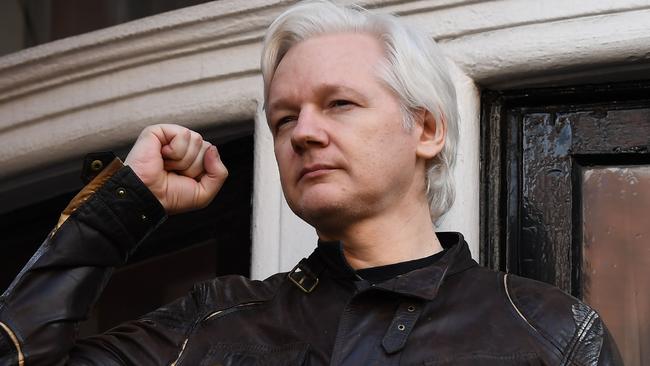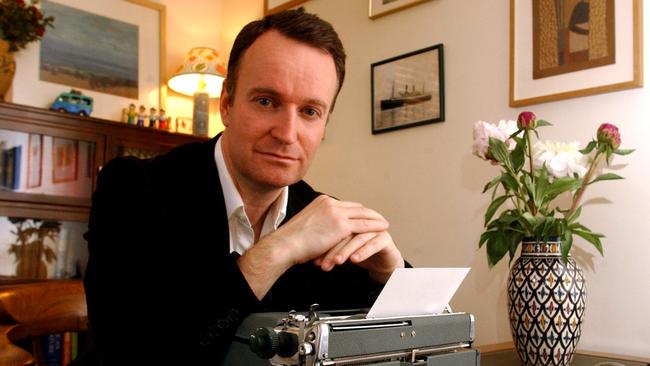Julian Assange: Andrew O’Hagan blows whistle on WikiLeaks chief
‘The extent of Julian’s lying convinced me that he is probably a little mad, sad and bad’.

Andrew O’Hagan’s new book is a triptych of long essays about personality in the age of the internet, originally published in the London Review of Books. Two of the three subjects are Australians. The first is Julian Assange, who in 2011 enlisted O’Hagan as the ghostwriter of an ill-fated autobiography. The second is computer scientist Craig Wright, who last year laid claim to being the shadowy Satoshi Nakamoto, inventor of the online currency bitcoin. The third piece is on online identity, something O’Hagan explored by using the name of a young man who died in 1984.
The essays are unified not just by their subject matter but by the high level of intelligence and sympathy used to probe cyber-age themes. There are many ways in which the internet threatens to make us less human, and more stupid.

O’Hagan, a journalist, critic and Man Booker Prize shortlisted novelist, seems to have been spurred by the coarse and binary nature of that world to produce a set of meditations especially rich in old-school literary virtues.
The Assange piece, in particular, is a masterpiece of nuanced ethical engagement — and of devastating analysis. It’s the one I want to concentrate on here.
O’Hagan’s history with Assange began when British publisher Canongate “bought, for £600,000, a memoir by the WikiLeaks founder”. In proper postmodern fashion, this “memoir” did not exist at the time. The idea was that Assange, having received his advance, would write such a book in the near future. Or rather that O’Hagan would help him to.
Over the next few months, O’Hagan valiantly toiled to extract from Assange a book that, it became excruciatingly clear, he didn’t really want to write.
In the end, O’Hagan produced a draft that Assange refused to sign off on. The publishers released it anyway, under the title Julian Assange: The Unauthorised Autobiography.
Assange didn’t like that. And then O’Hagan published his unflattering account of what happened behind the scenes, which Assange must have liked even less. Assange, it turns out, made a grave mistake when he invited the astute and sceptical O’Hagan into his orbit.
But that mistake was symptomatic, O’Hagan believes, of the man’s chronic tendency to forget that other people have minds of their own. “He thought I was his creature and he forgot what a writer is, someone with a tendency to write things down and perhaps seek the truth and aim for transparency.”
Assange too, of course, claims to be a fan of truth and transparency. But he and O’Hagan have different ideas of what these things are, and of how they should be arrived at. For Assange, transparency is something you demand from institutions. And since institutional truth must be total, it is only fair it should be extracted and dumped by machine, with minimal human involvement. Even Edward Snowden has chipped WikiLeaks for its “hostility to even modest curation”.
Assange thinks big. He is, says O’Hagan, “not a details guy”. He has a few simple and unbendable beliefs, and he prosecutes them with a puritan’s zeal. He loves “the big picture … but not the fine print”. For O’Hagan, novelist and man of letters, things are the other way around: maybe there is a big picture, but it can’t be reached except by way of the fine print: the specific observation, the quoted piece of dialogue.
Another reviewer of this book has said it deals with “slippery” characters. But slippery isn’t quite the word: groping through the smog of Assange’s rhetoric, O’Hagan sometimes seems to wonder if there’s any character behind it at all. At one point, Assange’s agent assures O’Hagan that Assange, despite appearances, does want his memoir to happen.
O’Hagan’s exasperated reply is instructive: “And what does that mean, ‘I want a book’? He wants a book by not allowing it to be written? By not doing the work? By not committing himself to the interviews or liking what emerges from them? In what sense does he want a book?”
Words, O’Hagan insists, must have meaning; claims must have content. This isn’t just a linguistic point. It is the basis of ethics: in the end, we must be judged by what we do, not what we say. Assange, the big-picture man, seems to think that having high ideals exempts you from having to behave with personal integrity — an attitude that has fuelled many a disastrous revolution. As a young hacker, his handle was “splendide mendax”: noble liar. As an adult, he “has a notion”, according to O’Hagan, “that WikiLeaks floats above other organisations and their rules”.
If we take the view that morality begins at home, Assange looks like an iffy hero for our times. O’Hagan, like other Assange watchers, finds himself repelled by the visionary’s table manners. He eats with his hands. He licks his plate. He lets other people make his meals, and — far from washing the dishes — never so much as takes his dirty stuff to the sink. This, O’Hagan concedes, “doesn’t make him Josef Mengele”. Still: “I found his egotism at the dinner table to be a form of madness more striking than anything he said.” Again, the local detail suggests the wider ethical point. If we all gave ourselves permission to behave like that, what would the world look like?
Early in his career, Assange was fond of quoting a maxim of Oscar Wilde’s: give a man a mask and he will tell you the truth. WikiLeaks, whose code conceals the identities of its informants under a veil of random noise, is premised on the idealistic belief that Wilde was right. But was he? Spend 10 minutes online and you start to wonder if Wilde’s epigram doesn’t need serious tweaking. Give people a mask and they will behave abysmally.
The history of WikiLeaks offers equivocal evidence on this point. Chelsea Manning, who passed American military secrets to the site, can just about be called a “whistleblower” in the classic sense. She saw things that concerned her; she leaked them, although she leaked mountains of other data too; she didn’t precisely step forward as the leak’s author, but she knew the risk of exposure was high; and she suffered the consequences when they came.
Compare that with WikiLeaks’s latest contribution to history: the publication, during the American election campaign, of the internal emails of the Democratic National Committee. That was not a leak but a hack, whose goal wasn’t to improve American democracy but to subvert it, to sway the election in favour of a man with a professed contempt for the nation’s institutions, its free press, and indeed for truth itself.
So who was the masked perpetrator of that hack? The FBI, CIA and NSA have unanimously found that it was Russia. Against this, we have Assange’s personal assurance that it wasn’t. But Assange, as O’Hagan is the latest to demonstrate, has frittered away his right to be taken at his word about anything. He claims to be a friend to America and its institutions. But in practice he seems to be out there with Vladimir Putin and Donald Trump, trying to knock down those institutions with a wrecking ball.
There was a time when he could plausibly assert his goal was to replace America’s imperfect democracy with a better one. But the American landscape has changed: these days, the alternative to imperfect democracy is a ghastly reality show that can’t be switched off. Which of these things would Assange prefer? If it’s the former, he has a funny way of showing it. But the radical mind is never keen to embrace imperfection.
It would be misleading to convey the impression that O’Hagan’s essay on Assange is a hatchet job. Like the book’s other pieces, it is rooted in a desire to understand. Indeed its overall effect is poignant, because it demonstrates that Assange is his own worst enemy. He seems constitutionally incapable of keeping a friend. He trails behind himself a horde of former sympathisers turned whistleblowers, a category that now includes O’Hagan.
“The extent of Julian’s lying convinced me that he is probably a little mad, sad and bad.”
In the tribal world of the internet, this will be taken as proof that O’Hagan is an “enemy” of Assange, out to smear him. But let us recall that this is a book, not a tweet. In books, context still matters, and so does language. In a book, as in the more civilised spheres of real life, “convinced” isn’t something you start off being; it’s something you become, after absorbing the little details and seeing what they add up to.
David Free is a writer and critic. His new novel is Get Poor Slow.
The Secret Life: Three True Stories
By Andrew O’Hagan
Allen and Unwin, 260pp, $29.99, 260pp



To join the conversation, please log in. Don't have an account? Register
Join the conversation, you are commenting as Logout